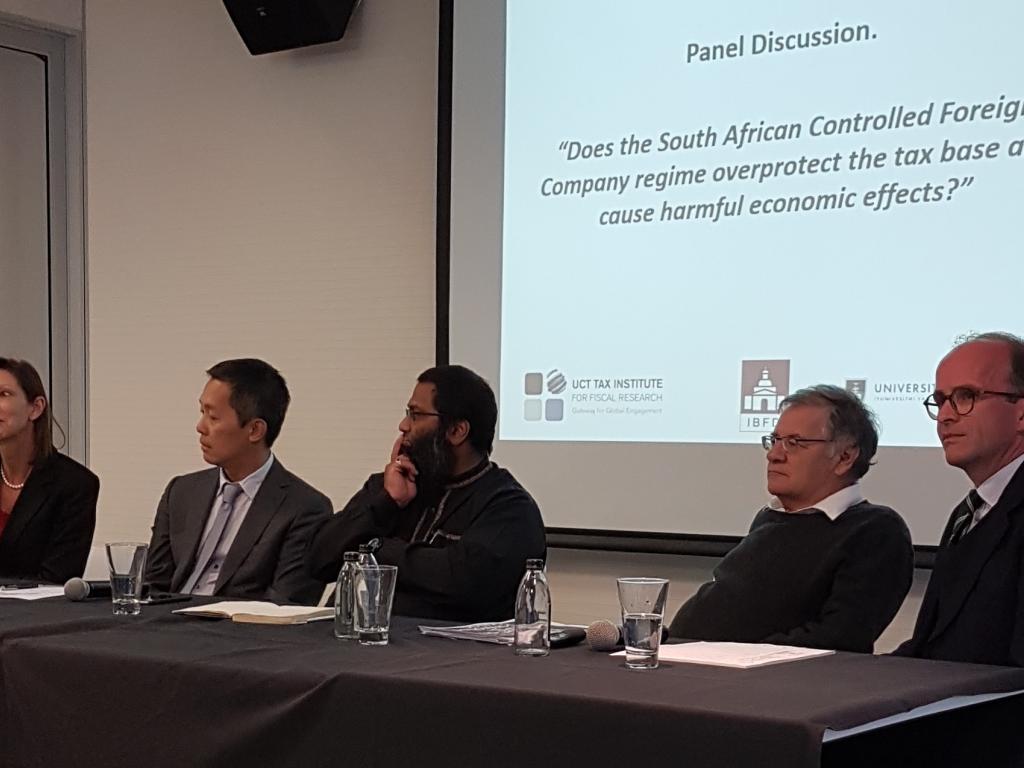UCT-IBFD Workshop on the New Global Tax Order

UCT-IBFD Workshop on the New Global Tax Order: Does the South African Controlled Foreign Company regime overprotect the tax base and cause harmful economic effects?
Cape Town, October 10, 2016. Approximately 60 delegates participated in a workshop in Cape Town presented by UCT's Tax Institute for Fiscal Research in collaboration with the International Bureau for Fiscal Documentation (IBFD) Amsterdam, to address a key aspect of the new global tax order. Controlled foreign company (CFC) rules is an area of contention emerging in the wake of the 2008 financial crisis and the G20/OECD BEPS project dealing with tax avoidance by multinational enterprises (MNEs). Participants were drawn from a wide array of backgrounds, including the National Treasury, SARS, the office of the Tax Ombud, professional firms, South African corporates, academics and postgraduate students.
South Africa's CFC rules essentially express the country's world view on how home grown MNEs should be taxed in respect of foreign earnings: should they compete on equal footing in foreign markets where they actively do business, and thus enjoy tax reductions offered by the destination market, or should they be taxed at the home tax rate regardless of where in the world they derive their profits, thus neutralising foreign tax savings.
To address this fundamental question, the workshop was guided by a stellar group of speakers.
Dr Shee Boon Law from the IBFD provided delegates with a global perspective of how countries around the world grapple today with this question in the design of CFC regimes. The key message was that economic theory is at play and until a country has clarity in this regard, CFC rules may well produce outcomes that may compromise self-interest and a country's competitive position. Prof Osman Mollagee, international tax partner at PwC Johannesburg provided real life examples of problematic aspects of the South African CFC regime, as it evolved over the past decade. Practical experience shows that the SA CFC regime no longer acts as a mere deterrent for deferral of SA taxes payable by MNEs, but actually results in tax being gathered in respect of bona fide foreign business transactions devoid of a motive to avoid any SA taxes. This is a particular problem in the arena of outsourcing and intellectual property. There appears to be no policy clarity about these outcomes. Associate Professor Deborah Tickle, partner at KPMG Cape Town and member of the Davis Tax Committee (DTC), delivered the first public summary of the forthcoming recommendations by the DTC to the Minister of Finance about South Africa's CFC regime. The DTC shares the view that CFC regimes can have a useful deterrent effect for artificial arrangements, but should not act as a tax raising measure. The key recommendation is that South Africa should not loose sight of how CFC regimes are employed by other countries in achieving a competitive global position for the overall tax regime applicable to MNEs, and should not attempt to be 'first in class' by designing complex rules. When the global landscape settles, the DTC recommends the reform of the SA CFC regime, incl. that it should apply to structures involving trusts. In a panel discussion moderated by Associate Professor Johann Hattingh from UCT, Judge Dennis Davis, chair of the DTC and Honorary Professor of UCT, explained his displeasure with the current SA CFC regime. In his view, the current legislation requires complete re-design, based on sound economic principle and aimed at artificial arrangements (similar to the position adopted by the Court of Justice of the European Union that CFC rules should apply only to "wholly artificial arrangements which do not reflect economic reality"). The audience actively participated in discussion with the panel. In closing, Prof Jennifer Roeleveld, Director of the UCT Tax Institute summarised the proceedings of the workshop with a call for continued debate between stakeholders to discuss the road to reform, as it was apparent from collected thinking that reform is required.
The proceedings of the workshop will stimulate further research within the UCT Tax Institute by staff and postgraduate students for future public dissemination.
A warm word of thanks to Webber Wentzel for making facilities available to host the workshop.
End.